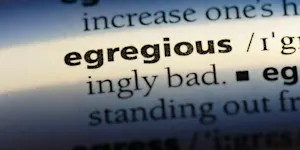What Makes This Word Tick
"Proscribe" is a fascinating word that's all about prohibition. It’s got a sharp edge to it, with a serious note that doesn’t leave much room for negotiation. When you hear "proscribe," you know something is officially off-limits.
If Proscribe Were a Person…
Proscribe would probably be a no-nonsense crossing guard, complete with a whistle and a bright orange vest. This person makes sure everyone follows the rules to keep things in order, standing firm in the face of chaos.
How This Word Has Changed Over Time
While “proscribe” has always maintained its strong sense of forbiddance, its usage has leaned more into legal and formal territories over time. Once it might have followed you home for minor rule-breaking, now it’s sticking more to the courtroom and boardroom.
Old Sayings and Proverbs That Use Proscribe
While there aren’t any well-worn proverbs that feature "proscribe" directly, the idea is often there in sayings like "forbidden fruit is the sweetest," which gets at the heart of proscribing certain temptations.
Surprising Facts About Proscribe
The word "proscribe" shares a root with "scribe," which might surprise you. Both stem from the Latin "scribere," meaning "to write," holding a common connection to written decrees and orders.
Out and About With This Word
You'll often see "proscribe" in the language of law, medical guidelines, and official mandates. It's a word that loves the company of regulations, setting boundaries with authority.
Pop Culture Moments Where Proscribe Was Used
In crime dramas, the dreaded word "proscribe" might appear when characters face banishment or restrictions enforced by the law, underscoring the drama of losing one's rights.
The Word in Literature
"Proscribe" commonly finds its place in legal thrillers and historical novels where prohibitions and edicts shape the narrative, giving readers a sense of the severe or consequential.
Moments in History with Proscribe
During the Roman Era, ‘proscription’ was no small matter—used to label enemies of the state, leading to confiscation of property and often worse. A harrowing example of taking “proscribe” to an extreme.
This Word Around the World
In French, "proscrire" carries the same weighty sense of meaning. Different languages have their version, all essentially forbidding something clearly and unequivocally.
Where Does It Come From?
"Proscribe" hails from the Latin "proscribere," to publish in writing or publicly declare as banned, with "pro" meaning "before" and "scribere" meaning "to write," once again highlighting its roots in official orders.
How People Misuse This Word
Often mixed up with "prescribe," which is about recommending or advising, "proscribe" takes a hard line in the sand—clear in its intent but still occasionally misapplied.
Words It’s Often Confused With
Prescribe: Suggests a course of action, usually with a positive connotation.
Forbid: Similar but less formal and not as enduring.
Ban: Another synonym but lacks the formal, written aspect.
Additional Synonyms and Antonyms
Synonyms for "proscribe" include "ban," "prohibit," and "outlaw." Antonyms would be "permit," "allow," and "authorize."
Want to Try It Out in a Sentence?
Local health officials may proscribe certain high-risk activities during a public health emergency to protect the community's well-being.
















